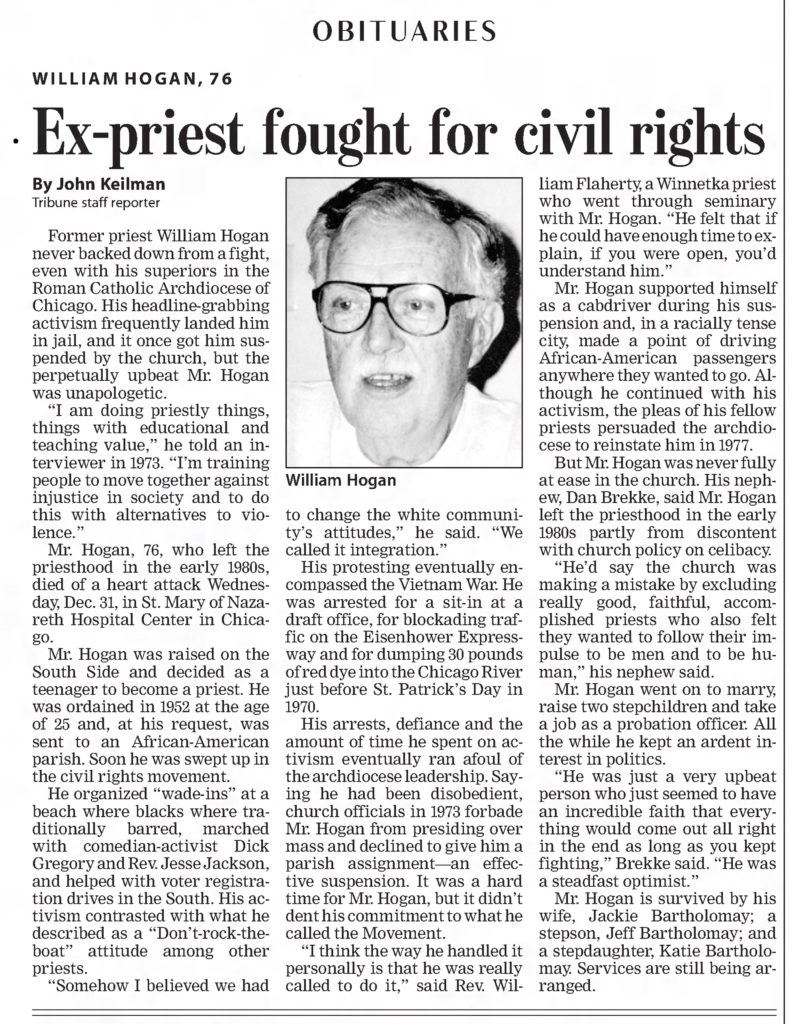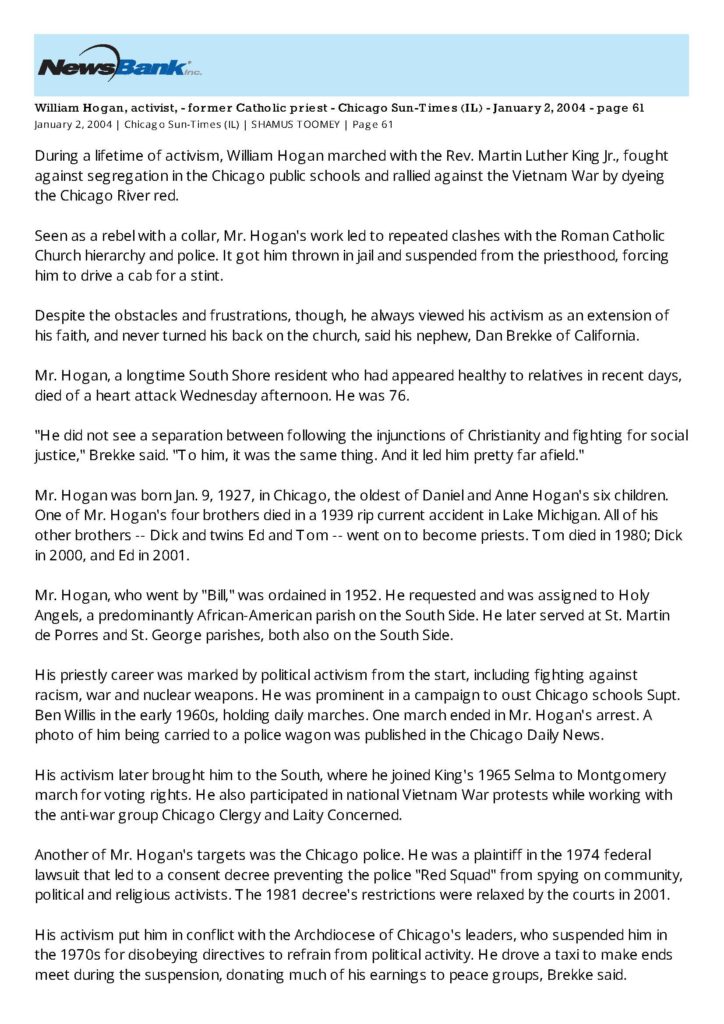News of the tornado that hit Utica, Illinois, on Tuesday night made me think about the deadly twisters (see, I still have some newspaper guy in me) that hit northern Illinois on April 21, 1967. I remember the day because Mom picked me up at school and we had to get off the road when an extremely intense thunderstorm swept through; she pulled off Exchange Street into an abandoned farm yard in what is now a commercial area in University Park. It was only about 4 in the afternoon, but the sky was nearly black and it rained so hard for about five or ten minutes that you couldn’t see to drive. As it turned out, storms were sweeping the entire region. At 4:30, a twister hit a high school in Belvedere, just outside Rockford, killed 24 and injured 400. About 45 minutes later, another tornado struck Oak Lawn and nearby suburbs, about 20 miles north of us, killing 33 and injuring 500.
Chicago Then
By way of Disarranging Mine:
“Charles W. Cushman Photograph Collection:
“Charles Weever Cushman, amateur photographer and Indiana University alumnus, bequeathed approximately 14,500 Kodachrome color slides to his alma mater. The photographs in this collection bridge a thirty-two year span from 1938 to 1969, during which time he extensively documented the United States as well as other countries.
“There’s an easily searchable index. He took thousands of pictures in Illinois, most in Chicago, a few in Springfield. They’re all beautiful.”
More on Uncle Bill
The death notice we sent to the Tribune:
Hogan, Bill
The Rev. Bill Hogan, a former Roman Catholic priest in the Chicago archdiocese, died Wednesday, Dec. 31, 2003, in Chicago. Throughout his life, Bill was guided by a fierce sense of justice and bore witness to his faith by living Christ’s injunction in Matthew 25 to comfort and lift up all his brothers and sisters. Bill was born in Chicago on Jan. 9, 1927, the son of Edward D. and Anne O’Malley Hogan. He attended St. Kilian’s School before following his vocation at Quigley Preparatory and St. Mary of the Lake seminaries.
He was ordained in 1952 and assigned to Holy Angels parish on Oakwood Boulevard. He subsequently served at St. Martin de Porres, St. George on the Ryan, and Our Lady of Lourdes, all in the city. But Bill’s work as an agent of Christ stretched far beyond the congregations he served. He carried his faith into the major social and political struggles of our time: the movements to establish civil rights and economic justice for all, to stop the Vietnam War, and to end the evil of nuclear arms. This part of Bill’s ministry took him from Chicago’s South Side to Selma and Montgomery, Alabama, to Washington and far beyond; it also put him into conflict with both civil and religious authorities; he was arrested many times during protests and suspended by the Chicago archdiocese.
Eventually reinstated, he decided to continue his work outside the church, and married. He taught briefly in Chicago high schools before finding his next professional calling, working in Cook County’s adult probation department. He was enthusiastic, stimulating, challenging, brilliant, and steadfast in all his roles in life: priest, husband, stepfather, brother, uncle, friend, colleague, adviser, ally, parishioner and choir member (at St. Bride’s in his adopted South Shore neighborhood). Most of all, his life reflected a deep and abiding optimism.
Bill is survived by his wife, Jackie Bartholomay, and stepson Jeff and stepdaughter Katie Bartholomay; by his brother-in-law, Steve Brekke; by his cousin, Jack Fitzgerald; by niece Ann Brekke and nephews Chris, John and Dan Brekke; and by great-nephews and -nieces in Chicago, Brooklyn, N.Y., and Berkeley, Calif. Bill was the last surviving of six siblings: brothers Dick, Tom, and Ed, all ordained Roman Catholic priests, and John; and one sister, Mary Alice Hogan Brekke. Visitation will be held from 3 p.m. to 7 p.m. on Friday, Jan. 9, 2004, at St. Bride’s Church, 7811 S. Coles Ave., Chicago (773 731-8822), with a prayer and memorial service from 7 p.m. to 9 p.m. A funeral mass will be said at St. Bride’s at 10 a.m. Saturday, Jan. 10. Bill gave to many, and it would be fitting for his friends to make donations in his memory to causes of their choice.
Remember Bill: “Keep your eyes on the prize.”
Bill Hogan Obits
Updated with story images, May 2022.
Both the Chicago Tribune and Chicago Sun-Times ran obituaries on my Uncle Bill Hogan this morning — see below. The paper versions of the stories were supposed to include pictures that my sister Ann (and her family) ran down to the paper’s on New Year’s afternoon. The Trib’s version of the story uses some of the paper’s old clips, notably Jack Star’s magazine profile of Bill from 1973. The Sun-Times version follows the obit material I sent pretty closely.
So now I only hope that no one in Bill’s wide circle of acquaintance gets bent out of shape because their viewpoint wasn’t represented.


Goodbye, Uncle Bill
Got a call from Kate about 4 this afternoon that my Uncle Bill had had a heart attack and died. After the shock, I shifted into news mode and sent this obit info to the Trib and Sun-Times in Chicago:
The Rev. William Hogan
Born Jan. 9, 1927, in Chicago
Died in Chicago Dec. 31, 2003.
Bill suffered a heart attack early this afternoon and died after being taken to St. Mary of Nazareth Hospital on the West Side. Arrangements for a funeral and other services are pending.
Bill was a former Roman Catholic priest (though he would have disputed the adjective “former”), ordained in 1952, whose career was marked from its earliest days by political activism, notably in the civil rights, antiwar, and antinuclear struggles of the 1950s, ’60s, ’70s, and ’80s.
He was prominent in the campaign to oust Chicago school Superintendent Ben Willis in 1963 (or maybe ’64; there were daily marches against Willis to protest school segregation in the city, and one day the Chicago Daily News landed on our front step with a picture of Bill being carried to a paddy wagon; another notable picture appeared on the front page of Chicago Today around 1970 — he and another protester climbing out of a canoe near the Michigan Avenue Bridge after dumping red dye in the river to protest the Vietnam War; both were arrested for their trouble).
He participated in several of the major civil rights campaigns in the South, including the Rev. Martin Luther King Jr.’s Selma-Montogomery march in 1965. Later, he joined in the local and national campaigns to end the U.S. war in Vietnam, was a leader in Chicago Clergy and Laity Concerned (an antiwar group), and was one of the plaintiffs in a pair of federal lawsuits in 1974 and ’75 that sought to stop alleged Chicago Police Department harassment of political activists (the suits led to a consent decree, still in force, that restrains police surveillance of political groups).
Bill’s work in the streets frequently put him at odds with the leadership of the Chicago archdiocese, and in the 1970s he was suspended for disobeying directives to refrain from political activity. He drove a cab for a time to make ends meet (he turned over most of what he made to peace organizations; Jack Star of the Tribune magazine did a long feature about Bill, with a nice picture of him in his cab, outside Holy Names Cathedral, that was published in 1976 or so). In part because members of his Mundelein seminary class protested, the diocese reinstated him in 1977, the class’s silver anniversary year. Bill wound up leaving the priesthood in the early 1980s, partly over his opposition to the Church’s position on celibacy. After leaving the priesthood, he got married and taught for a time in the Chicago schools; for the past decade or so, he worked as a case officer in the Cook County adult probation department.
His first parish assignment in the early 1950s was at Holy Angels, which was later George Clements’s parish (on Oakwood Boulevard on the South Side). He also served at St. Martin’s and St. George’s parishes (both adjacent to the Dan Ryan — St. Martin’s on 59th Street is still there, though St. George was razed in the early ’70s) and after his suspension and reinstatement at Our Lady of Lourdes on the West Side.
He was the oldest of six children born to Daniel Edward and Anne O’Malley Hogan; his father, a First National Bank employee, died in 1941. His mother, a longtime teacher at Chicago’s Copernicus elementary school, died in 1980.
Bill was the oldest of four Hogan sons to be ordained Roman Catholic priests. His twin brothers Tom and Ed were ordained Carmelites in 1958 (Tom died in 1980; Ed — also known by his order name of Ben Hogan, served at Mount Carmel High School among many other assignments — died in 2001). His brother Dick was ordained in 1965 and served in the Joliet Diocese; he died in 2000.
My mother, Mary Alice Hogan Brekke, was Bill’s only sister. She passed away in August.
He’s survived by his wife, Jackie, his stepson Jeff, and stepdaughter, Katie; by his brother-in-law, Steve Brekke; by me and my brothers, John and Chris, and sister, Ann; and by great-nephews and -nieces in Chicago, Brooklyn, and Berkeley, Calif.
But most of all, he’s remembered by everyone he met in his journeys through the Church and “the Movement” (as he still called it) as a real lion for justice and for people’s rights and dignity; and as one of the world’s great optimists: someone who was sure that the world will come out right if you keep fighting for what you believe is right.
Hope they do a little story on him.
